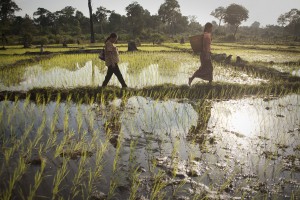This week, USAID takes on the blurry line between development and democracy
Porter McConnell is Oxfam’s policy and advocacy manager for Aid Effectiveness. Once in a while, the development and democracy communities have a “Eureka” moment: • Development types are realizing that poverty + stuff does not = development. Development is a relationship that we can support, it’s not a set of items that poor countries are […]
Porter McConnell is Oxfam’s policy and advocacy manager for Aid Effectiveness.
Once in a while, the development and democracy communities have a “Eureka” moment:
• Development types are realizing that poverty + stuff does not = development. Development is a relationship that we can support, it’s not a set of items that poor countries are lacking.
• Democracy types are realizing there’s no way to build country systems short of actually using them. Developing country governments are like muscles: if the US and other donors leave them to atrophy because we can’t “trust” them, they will never become strong.
In part because of Arab Spring, the democracy and development communities are seeing anew that their fates are inextricably linked. Yesterday and today, USAID is holding a conference called Democracy, Human Rights, and Governance 2.0. Speakers from USAID Administrator Raj Shah to Thomas Carothers of the Carnegie Endowment are calling for better integrating US development and democracy efforts.
It’s about time: in the last 10 years, the pendulum of donor opinion has swung from excluding governments entirely and funding civil society to focusing entirely on supporting governments and downplaying the importance of civil society. Heading into the Fourth High Level Forum on Aid Effectiveness in Busan this fall, the development community needs to avoid the temptation to engage in these wild pendulum swings. Both government and civil society have to be engaged in order to see any lasting development impact.
Development at its core is about the compact between people and their governments. US programming, whether it’s development or democracy, needs to keep that compact front and center. I’ll give you a recent example from Ecuador: the European Commission (EC) announced it was funding the Ministry of Education directly to implement its ten-year national education plan. Local civil society had to convince the EC to fund civil society oversight too, to hold the government accountable to the plan. If the EC had had the compact in mind, they would have sought from the start to support Ecuador’s education plan in a way that strengthened that critical relationship between people and their governments.

That’s not always easy to do. For civil society to play a “watchdog” role, they need the space to operate without government crackdowns. Cambodia is a test case of this right now. If the Cambodia NGO law that’s being discussed right now becomes law, exercising healthy oversight over the Cambodian government will effectively become illegal. Human Rights Watch and Freedom House are speaking out, but many of the development groups are staying silent. Development groups have historically stayed out of the fray when civil society space is threatened. They reason is that they can be more useful addressing economic and social rights by maintaining relationships with the government. The problem is, under the proposed NGO law, small community-based organizations may find it difficult to continue current operations, and flagship US programs like Feed the Future won’t have any implementers. Development NGOs simply can’t afford to shy away from talking about civil society space. That’s why Oxfam is speaking out.
But why should democracy groups care if their development colleagues speak out? It turns out that one of the best way to make progress on governance is through development programs, where “democracy” is not the central goal of the program. One oft-cited example of this is adaptation to climate change, where some governments have given their blessing to multi-stakeholder bodies because the frame is climate, not governance. Democracy, human rights, and governance groups would do well to engage development colleagues, and their resources, in the broader effort to increase accountability.
For more about what the future holds, check out video coverage of a Tuesday panel on “Integrating Democracy, Human Rights & Governance across All Development Goals”, featuring Oxfam America Vice President Paul O’Brien.